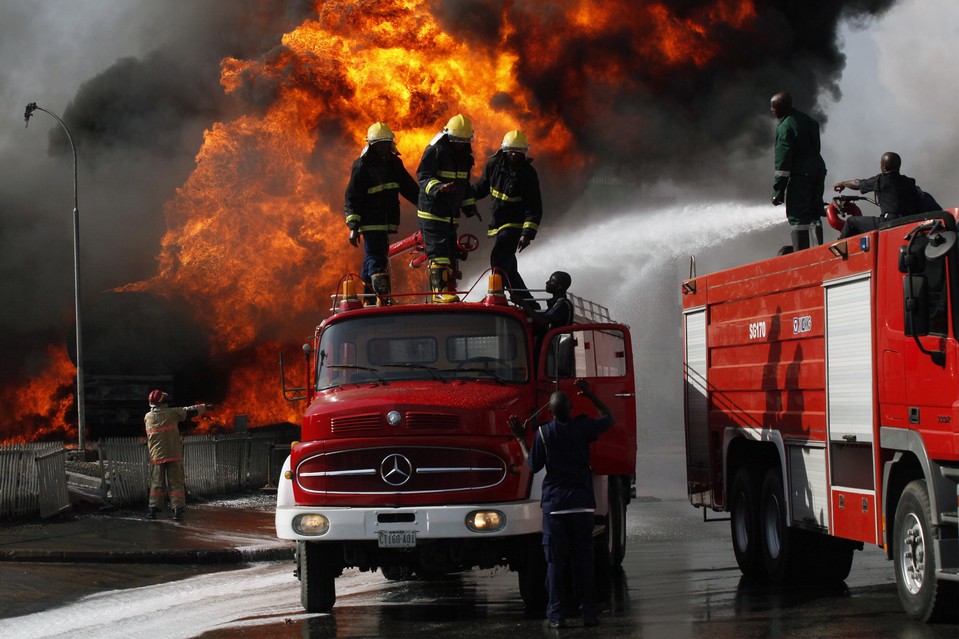States must rescue Fire Service to save lives, property
The incessant loss of lives and property to avertible fire disasters across the states has since become a matter of serious concern in Nigeria. Dozens of markets in different cities and towns, including Maiduguri and Kano, have been gutted by fire, some of them twice, this year alone. Four of the fire outbreaks occurred in […]

FILE PHOTO
The incessant loss of lives and property to avertible fire disasters across the states has since become a matter of serious concern in Nigeria. Dozens of markets in different cities and towns, including Maiduguri and Kano, have been gutted by fire, some of them twice, this year alone. Four of the fire outbreaks occurred in the timber markets located at Bodija in Ibadan, Oyo State; Sabon-Gari in Zaria, Kaduna State; Ebute-Meta in Lagos, and Balogun also in Lagos. This does not include several fires from petrol tanker accidents and others that were never reported.
From the media account that trailed many of the fire outbreaks, prompt rescue operations could have helped to minimize much of the colossal losses from the fires if many of the states had functional firefighting trucks. A recent in-depth report published by the Daily Trust newspaper indicates that ‘Fire Service stations in many states of the federation have been grounded on account of poor infrastructure, the dilapidation of equipment especially fire-fighting trucks, and inadequate personnel. These critical challenges are not only affecting their efficiency as a disaster management outfit but also inhibiting their prompt interventions on receipt of distress calls.’
In Kogi State, for instance, the acting director of the State Fire Service, Salawu Umar Ozigi, said the lack of serviceable vehicles, working tools and inadequate personnel grounded the activities of the command. “The two firefighting vehicles under our care have all broken down. Currently, there is no vehicle to respond to distress calls,” Ozigi said. If, as Ozigi said, only N40 million is needed to repair the two fire-fighting trucks to save lives and property worth hundreds of millions of naira, it sounds paradoxical that the state would render the agency redundant over a comparatively meagre amount.
Owing to unserviceable fire-fighting equipment in Edo State, response to distress calls is usually provided by Fire Service men from the University of Benin, the Air Force and the Federal Fire Service (FFS). Out of the six fire-fighting trucks in the state, only two are said to be functional even though no such trucks were seen at the premises when reporters visited the state Fire Service office.
While inadequate personnel is the challenge facing the Fire Service in Delta State, the situation in Bauchi State is that of grappling with a lack of firefighting trucks, poor funding and logistics. Only two functional fire trucks are currently available to respond to distress calls in the whole of Bauchi, the state capital. This was why the fire that razed Azare market some months ago could not be put off because only one fire-fighting truck was available.
Besides the dearth of personnel, most of the fire service stations in Yobe State have no functional trucks. Gashua and Nguru have no fire-fighting trucks. As happened in Potiskum where fire razed more than 94 shops in January 2023, operatives in these areas use small KIA trucks augmented by buckets of water to put out fires. Several letters written to the state government seeking interventions were said to have received no attention.
In Niger State, the Fire Service complex at the Gwari market was taken over and converted to shops by the Chanchaga local government authorities. Findings revealed that some local government headquarters, including Lapai, Agaie, Bida, Kontagora, Suleja, New Bussa and a few others each have a Fire Service station with one fire-fighting truck. While it was gathered that Agaie and New Bussa have functional fire-fighting trucks, the personnel in Agaie are using a temporary building as their office accommodation. The lack of fire-fighting equipment in Mokwa, a local government headquarters in the state, led to the loss of lives and property in a night fire that razed more than half of the central market in Mokwa on January 27, 2022.
While we decry the inefficiency and usual lacklustre response from the Fire Service during emergency calls in most states of the federation, we condemn in strong terms the failure by many state governments to provide functional fire-fighting trucks and equipment that will support state-owned fire service stations to carry out their mandate. A situation in which having one functional fire-fighting truck in one local government area has become an exception rather than the norm shows how states care less about human lives and their assets.
It’s no less irresponsible and ridiculous that states would expend so much on bullet-proof cars, doors and windows to protect state governors on the road and in their offices and houses, yet refuse to spend relatively smaller amounts to protect millions of residents in the state. As a constitutional mandate, states must come to the rescue of Fire Service stations by availing them with an adequate number of trained personnel, functional fire-fighting trucks and equipment that would guarantee rapid response to distress calls.
There is also the issue of training of staff and employment of adequate personnel for the fire service. These are critical areas that need to be looked into and addressed,
Nowhere in the world is the protection of lives and property compromised. That must, therefore, not happen in any of the country’s 36 states and the FCT.
